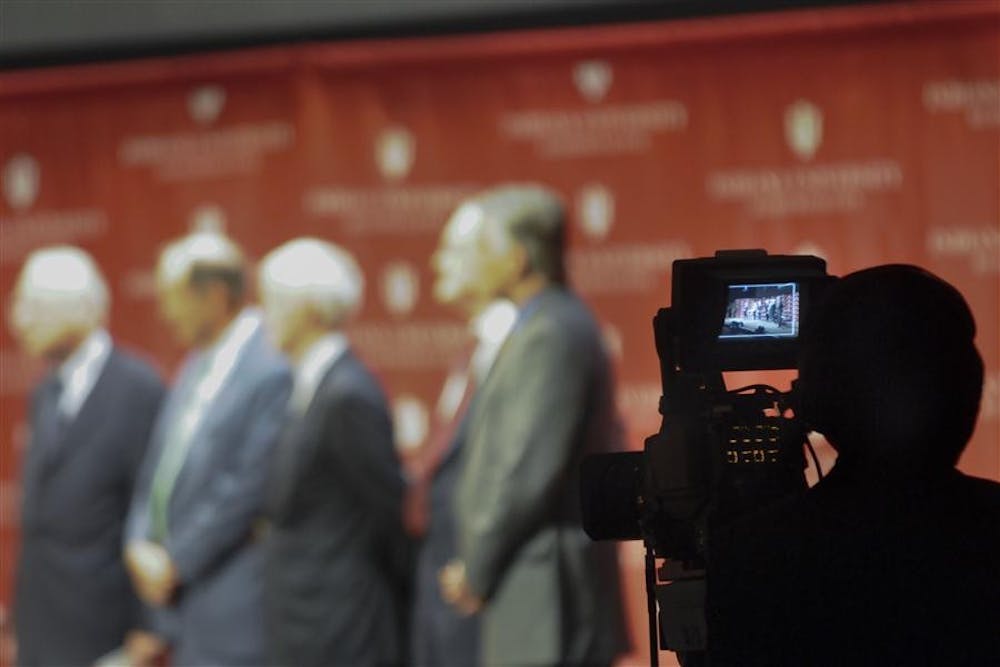In 2002, they had the weight of history on their shoulders.
In 2004, they passed that weight to Congress.
Six-hundred-and-twenty-four pages of answers and a decade of questions later, the members of the National Commission on Terrorist Attacks Upon the United States, better known as the 9/11 Commission, reunited yesterday at IU to reflect upon their findings and evaluate Congress’ response to their advice.
Welcomed by IU President Michael McRobbie and introduced by moderator and journalist Ken Bode, the commissioners found their respective seats center stage in the IU Auditorium. It was the first time the commissioners had reunited since the commission report was released in 2004.
The applause subsided as Lee Hamilton, former congressman for Indiana’s 9th District and vice chairman of the commission, thanked the University for its hospitality.
He casually spoke of the need for a public officials hall of fame, where he would induct Thomas Kean, chairman of the commission. Kean spoke admirably of Hamilton as “one of the most extraordinary public servants I know.”
Former Indiana Congressman Timothy Roemer summarized the introductions in a light-hearted manner, boasting about meeting IU mens’ basketball coach Tom Crean earlier in their visit.
But the tone swiftly shifted to that of a more serious note as Kean, Hamilton and Roemer spoke of the extraordinary significance of the commission’s bipartisan efforts.
“This is the first time we have been together since we wrote the report, but when I read the report now I can still hear your voices,” Kean said.
Moderator Bode noted that the commission was created to fail based on its combination of five Democrats and five Republicans, a bipartisan effort many doubted could succeed.
The commission exceeded expectations.
“The country saw for the first time in a long time a group of Republicans and Democrats working together in the interest of the American people,” Kean said.
Roemer was quick to clarify that their success need not be credited to the commissioners’ ability to set aside their own political interests.
Rather, he said it was the resolve of the 9/11 families, which had lost so much and craved the truth, that propelled the commissioners to investigate the attacks for the American people.
“They put America first. Unity, flying flags, giving blood ... The American people rallied, and they weren’t going to be terrorized,” he said.
Challenging their findings and demanding accountability, the 9/11 families served as some of the commission’s toughest critics. But the commissioners said their responsibility to the American people diminished any natural tendency they had to be partisan.
“I recall vividly the day we released the report,” Commissioner Fred Fielding said. “I think we were more nervous than anything, because we met with the families before we had the public hearings and the release. We were so nervous they would turn on us or wouldn’t be happy, and it was the greatest relief to all of us when they walked up and asked us to sign their books. “
The bipartisan strategy and genuine inspiration allowed the 9/11 Commission to meticulously comb through the events leading up to the attacks on the United States on Sept. 11, 2011, and formulate a plan to prevent such acts from occurring ever again.
But Commissioner Slade Gorton said their’s was merely a procedural success.
“We started something,” he said. “We didn’t finish it. We showed that different parties and administrations can work together.”
And they expect Congress to follow their example.
Commissioner Jamie Gorelick said Congress’ response to the 9/11 Commission’s report was one of the quickest in U.S. history.
The administration implemented national security policies that prevented another attack on the United States over the last decade, and they took down Osama Bin Laden.
The only thing Congress didn’t react to, however, was itself, she said.
“I don’t think we can be safe if we are as divided as we are now as a country,” Gorelick said. “You cannot look at New York and not see that resilience ... We need that sense that together we can prevail against almost anything.”
The commissioners listed several security measures they say Congress has yet to act upon, including reorganizing and enhancing a communication network amongst the intelligence agencies.
“The 9/11 Commission is a high point of public life,” Commissioner James Thompson said. “There are key areas left undone. Lives were lost on 9/11 because police and firemen were not able to talk to each other properly.”
Hamilton said the commissioners still fear complacency throughout the government and the nation 10 years after the attacks.
“I think we learned an awful lot about America,” Hamilton said. “Where else in the world can we sit down with the President and Vice President? I came out of it all with a whole lot more faith in our government.”
9/11 Commission reflects on a divided America

Get stories like this in your inbox
Subscribe





